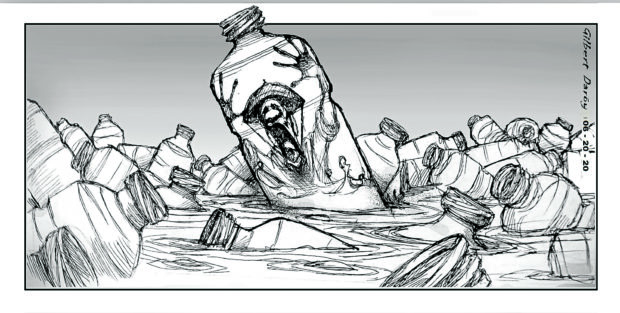Plastic nation

Editorial cartoon
The Philippines has topped another ignominious list, this time as the world’s largest contributor to plastic waste that ends up in the world’s oceans. Advocates say this makes it even more urgent for the government to put in place a national policy on single-use plastic (SUP). Attempts at passing a comprehensive law on this problem have been unsuccessful in at least the past four Congresses.
According to an Ocean Cleanup study published in the Science Advances journal last April, the Philippines’ more than 400 rivers discharge 356,371 metric tons of mismanaged plastic waste (MPW) per year. The 27-kilometer Pasig River was named the most polluting river in the world, contributing 63,000 tons of plastic, while six others in the country were also in the Top 10: Tullahan, Meycauayan, Pampanga, Libmanan, Rio Grande de Mindanao, and Agno. Twelve more Philippine rivers copped the dubious distinction of making it to the Top 50, with the researchers noting that most MPW in fact found their way to the ocean from smaller rivers. The Philippine rivers, they added, represented more than a quarter of rivers worldwide accounting for 80 percent of ocean plastic pollution.
The global plastic waste problem has grown enormously in recent years, and “plastic pollution is one of the most pressing issues facing our planet,” said Helena Leurent, director general of nonprofit organization Consumers International. Among the most common SUPs are plastic grocery bags, bottles, straws, containers, cups, cutlery, and packaging for food and other merchandise.
In the Philippines, 91 percent of the plastic wastes collected by the Break Free From Plastic Movement for its 2020 Brand Audit Report were nonrecyclables, such as sachets. The group criticized what it dubbed as “false solutions” being proffered by some quarters to address the problem, such as replacing plastics with products made using unsustainable resources, or harmful practices such as incineration.
“I think it’s urgent there should be a national policy on this,” Climate Change Commission Commissioner Rachel Anne Herrera said at this year’s World Consumer Rights Day last March 15. She noted that while almost 500 cities, municipalities, and provinces have put in place SUP-related ordinances, they may differ in types of plastics that are not allowed, thus creating confusion across different jurisdictions. The plastic problem has become so immense that, in 2019, according to Herrera, the country used and disposed about 164 million sachets. About 95 percent to 99 percent of plastics used are made of petrochemicals, which could be harmful to the environment when burned and will not help in reducing the country’s greenhouse gas emissions. “There should be a uniform, unified, collaborative approach so everyone gets the benefits of the plastics regulation or ban,” stressed Herrera.
Seventeen experts behind the report “Breaking the Plastic Wave,” released by The Pew Charitable Trusts last year, said that unless major changes in relevant policies, business practices, and consumer behavior occur, the amount of plastic in the ocean could triple by 2040. Fish and other aquatic species could ingest plastics as they break down in the oceans, and they in turn could end up as food on the table for humans, posing risks to the health and livelihoods of fishermen and their families, and to the public health and food security of countries.
The experts are urging governments across the world to enact “ambitious policy measures” to encourage industries to innovate and remove avoidable, single-use, and hard-to-recycle plastic from the production chain. “Unless the plastics value chain is transformed in the next two decades, the compounding risks for marine species and ecosystems, our climate, our economy, and our communities will become unmanageable,” they warn.
There are at least four bills on this issue pending at the committee level in the Senate, while the House of Representatives in June approved on second reading House Bill No. 9147, which seeks to regulate the production, sale, and distribution, as well as the collection, recycling, and disposal, of SUPs. HB 9147’s provisions include the phaseout within four years of “non-compostable” SUPs such as utensils, cutlery, and food and beverage containers made of expanded polystyrene; and a ban within a year of drinking straws and stirrers, among others. The proposed law also wants a review of the recyclability of plastic bottles, packaging, and other products layered with other materials every two years.
Are these interventions feasible? Greenpeace campaigner Virginia Benosa-Llorin said it is not impossible to ban single-use plastics, as shown by existing regulations local governments have imposed: “These plastic bans can be successfully implementedʍas long as there is strong political will to do so.”




















